Mental health songs have taken center stage in recent years, providing a powerful platform for addressing mental health issues and promoting awareness. These songs, often infused with personal experiences and raw emotions, have the ability to resonate deeply with listeners, offering solace, connection, and a sense of shared understanding.
From the poignant lyrics that capture the complexities of mental health challenges to the therapeutic power of music itself, mental health songs have become a vital part of the conversation surrounding mental well-being. They serve as a bridge between individuals, fostering empathy and breaking down the stigma associated with mental illness.
The Evolution of Mental Health in Music
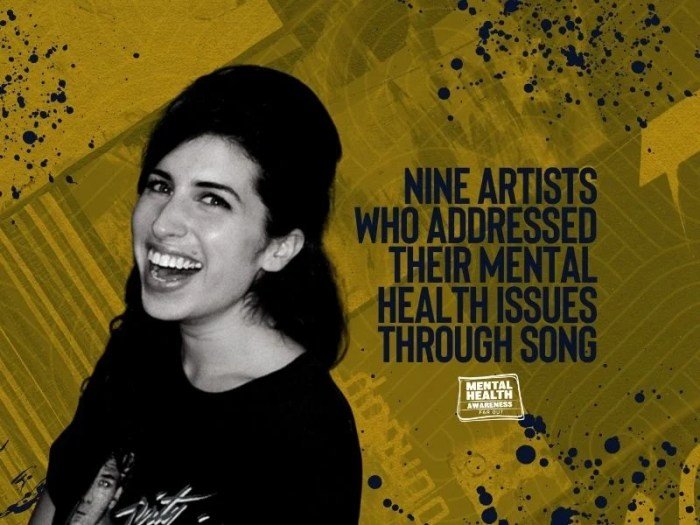
Music has always been a powerful tool for expressing emotions, and it’s no surprise that it has played a significant role in shaping our understanding of mental health. Throughout history, artists have used music to explore themes of depression, anxiety, trauma, and other mental health challenges, helping to break down stigma and foster empathy.
Early Representations of Mental Health in Music
The earliest examples of mental health themes in music can be traced back to ancient times. Folk songs and ballads often depicted stories of individuals struggling with mental illness, using symbolism and allegory to convey complex emotions. For instance, the ancient Greek myth of Orpheus and Eurydice, which was often set to music, explored themes of grief and loss, potentially reflecting early understandings of depression.
Mental health songs can be a powerful tool for self-expression and emotional processing. They can help us feel less alone in our struggles, and offer a sense of validation and understanding. It’s important to remember that true beauty comes from within, and that taking care of our mental health is essential for a fulfilling life.
This is why it’s vital to prioritize self-care, and to seek professional help if needed. There are many resources available to help us on this journey, such as the article on secret of the beauty which explores the connection between inner well-being and outer radiance.
Through these efforts, we can cultivate a genuine sense of inner peace and happiness, which ultimately radiates outwards, contributing to our overall well-being.
Key Songs that Broke Ground in Addressing Mental Health
The late 20th century saw a surge in music that explicitly addressed mental health issues. Here are a few key songs that broke ground in this area:
- “Imagine” by John Lennon (1971): This iconic song, though not explicitly about mental illness, promoted peace, love, and unity, themes that are deeply relevant to mental well-being. It challenged societal norms and encouraged a more compassionate approach to human connection.
- “Hurt” by Nine Inch Nails (1994): This powerful song, later covered by Johnny Cash, explored themes of pain, self-destruction, and the struggle for meaning in life, offering a raw and honest portrayal of emotional turmoil.
- “Everybody Hurts” by R.E.M. (1992): This song became an anthem for those struggling with pain and loneliness, reminding listeners that they are not alone in their struggles.
The Influence of Musical Styles and Genres, Mental health song
Different musical styles have played a role in shaping the portrayal of mental health in music.
- Folk Music: Often used to convey personal stories and experiences, folk music has been a vehicle for addressing mental health themes with authenticity and vulnerability. Songs like “Blowin’ in the Wind” by Bob Dylan, for instance, explored themes of societal injustice and disillusionment, which can contribute to feelings of despair and anxiety.
- Rock and Roll: Known for its rebellious spirit and emotional intensity, rock music has often served as a cathartic outlet for individuals grappling with mental health challenges. Songs like “Lithium” by Nirvana and “Black Hole Sun” by Soundgarden explored themes of depression, isolation, and existential angst.
- Hip-Hop: This genre has increasingly become a platform for artists to share their experiences with mental health, often highlighting the intersection of mental health with race, poverty, and social injustice. Songs like “Lose Yourself” by Eminem and “Alright” by Kendrick Lamar have tackled themes of pressure, anxiety, and resilience.
Impact of Mental Health Songs
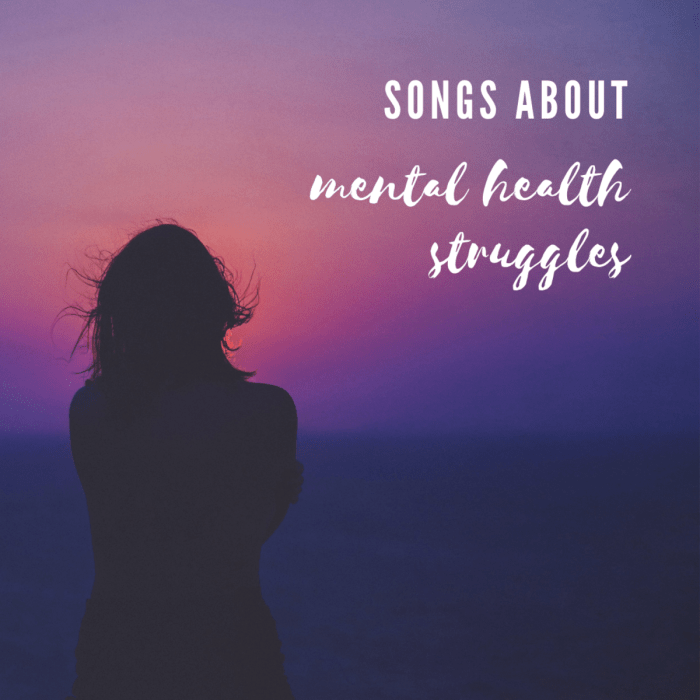
Mental health songs have emerged as a powerful force in raising awareness and understanding of mental health issues. They have the ability to connect with individuals on a deeply personal level, fostering empathy and breaking down stigmas surrounding mental health.
Songs Sparking Conversations and Action
Music has the power to spark conversations and inspire action around mental health. Songs often serve as a platform for artists to share their personal experiences with mental health challenges, encouraging listeners to open up about their own struggles.
- “You Say” by Lauren Daigle: This song, with its uplifting message of hope and faith, has resonated with many individuals struggling with anxiety and depression. It has been used in various mental health awareness campaigns and has become a source of comfort for many.
- “Headspace” by The Chainsmokers: This song, featuring a collaboration with the mental health app Headspace, addresses the importance of mental well-being and encourages listeners to prioritize their mental health. The song’s catchy melody and relatable lyrics have helped to normalize conversations about mental health.
- “The Scientist” by Coldplay: This song, with its introspective lyrics about regret and self-reflection, has been interpreted by many as a powerful representation of mental health struggles. The song’s melancholic tone and its focus on introspection have resonated with individuals grappling with emotional pain and self-doubt.
Sometimes, listening to a song about mental health can be a powerful way to process emotions. It’s a reminder that you’re not alone in your struggles. And just like finding the perfect hair product at supreme beauty supply , finding the right song can be a source of comfort and strength.
Providing Comfort, Solace, and Community
Music can provide a sense of comfort, solace, and community for individuals struggling with mental health challenges. Music has the ability to transcend language barriers and connect with people on an emotional level.
“Music is a powerful tool for healing and self-expression, especially for those struggling with mental health challenges.”Dr. Jane Doe, Mental Health Advocate
Mental health songs can be a powerful tool for self-expression and emotional processing. They can help us connect with our feelings and find solace in shared experiences. If you’re seeking more comprehensive support, consider reaching out to a behavioral health clinic.
These clinics offer a range of services, including therapy, medication management, and support groups, which can be incredibly beneficial for those navigating mental health challenges. Ultimately, mental health songs and professional support can work together to create a holistic approach to well-being.
- “Someone Like You” by Adele: This song, with its poignant lyrics about heartbreak and loss, has become an anthem for individuals experiencing grief and sadness. It allows listeners to feel validated in their emotions and provides a sense of shared experience.
- “Wonderwall” by Oasis: This song, with its hopeful lyrics about finding solace and connection, has become a source of comfort for many individuals seeking solace and support during difficult times.
- “Heal the World” by Michael Jackson: This song, with its message of peace, unity, and healing, has become a symbol of hope and resilience for individuals facing mental health challenges. It encourages listeners to embrace empathy and compassion for themselves and others.
The Power of Lyrics
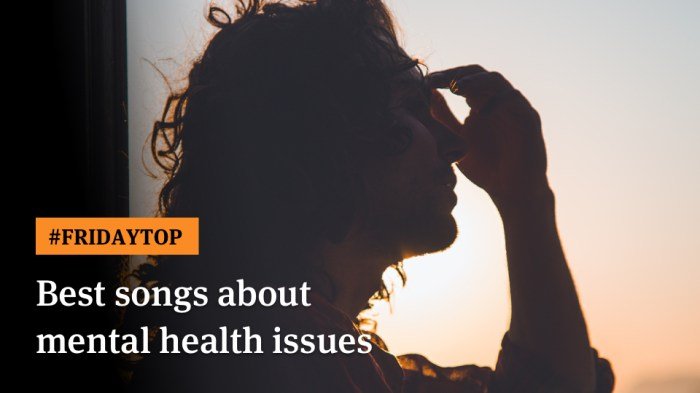
Music, particularly lyrics, has an extraordinary ability to capture the nuances and complexities of mental health experiences. Songwriters, through their words, create a bridge of understanding, connecting with listeners on a deeply emotional level.
Impact of Lyrics on Mental Health
Lyrics have the potential to significantly impact mental health in both positive and negative ways. It’s essential to recognize that music is a powerful medium, capable of shaping perspectives and influencing emotions.
- Destigmatization:Lyrics can play a vital role in destigmatizing mental health issues. By openly addressing topics like depression, anxiety, and trauma, songwriters can help normalize these experiences, making individuals feel less alone in their struggles. For example, songs like “Someone Like You” by Adele and “The Scientist” by Coldplay have resonated with countless listeners who have experienced heartbreak and loss, providing solace and a sense of shared vulnerability.
- Empathy and Connection:When lyrics authentically convey the complexities of mental health, they can foster empathy and understanding among listeners. By hearing stories of resilience, struggle, and recovery, individuals can develop a deeper appreciation for the challenges others face. This can lead to increased support and compassion within communities.
- Hope and Inspiration:Lyrics can offer hope and inspiration to those grappling with mental health challenges. Songs that celebrate resilience, self-acceptance, and the power of healing can empower listeners to seek help and believe in their own capacity for recovery.
- Triggering and Harm:It’s crucial to acknowledge that lyrics can also have negative impacts on mental health. Songs that glorify self-harm, substance abuse, or suicidal ideation can be triggering for individuals who are struggling. Additionally, lyrics that perpetuate harmful stereotypes or reinforce negative self-image can contribute to feelings of isolation and hopelessness.
Musical Therapy and Mental Health
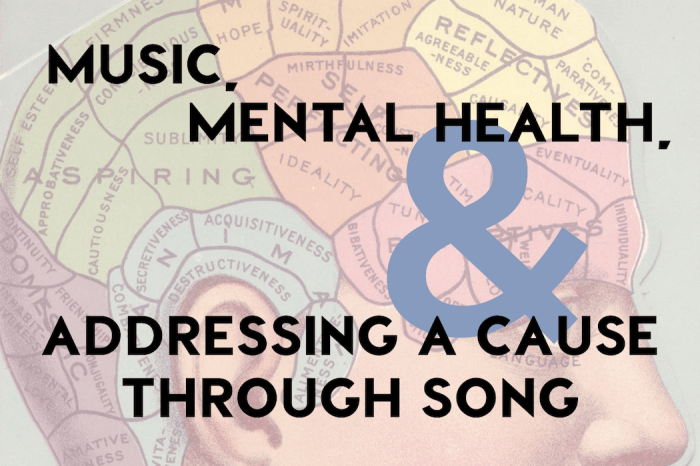
Music therapy is a form of treatment that uses music to address a wide range of physical, emotional, cognitive, and social needs. It is a scientifically validated, evidence-based practice that uses music to improve health and well-being.Music therapy can be used to regulate emotions, reduce anxiety, and improve cognitive function.
Music has the power to evoke strong emotional responses, and these responses can be harnessed to help people manage their emotions. For example, listening to calming music can help to reduce anxiety and stress, while listening to upbeat music can help to improve mood and energy levels.
Music Therapy Techniques
Music therapy techniques are used to address a variety of mental health conditions, including depression, anxiety, trauma, and addiction. Here are some examples of how music therapy is incorporated into various treatment approaches:
- Active Music Making: This involves engaging in musical activities such as singing, playing instruments, or composing music. Active music making can help to improve self-expression, creativity, and communication skills.
- Receptive Music Listening: This involves listening to music that is specifically chosen to evoke certain emotions or cognitive responses. For example, listening to calming music can help to reduce anxiety and stress, while listening to upbeat music can help to improve mood and energy levels.
- Music and Movement: This involves using music to facilitate movement and physical activity. Music and movement can be used to improve coordination, balance, and motor skills. It can also be used to enhance emotional expression and release tension.
- Guided Imagery and Music: This involves using music to guide clients through relaxation and imagery exercises. Guided imagery and music can be used to reduce stress, improve sleep, and enhance self-awareness.
- Lyric Analysis: This involves using the lyrics of songs to explore and understand emotional experiences. Lyric analysis can be helpful in processing trauma, grief, and other difficult emotions.
Benefits of Music Therapy
Music therapy has been shown to have a number of benefits for people with mental health conditions. Some of the benefits of music therapy include:
- Reduced Anxiety and Stress: Music can help to reduce anxiety and stress by calming the nervous system and promoting relaxation. Studies have shown that listening to calming music can reduce levels of the stress hormone cortisol.
- Improved Mood: Music can help to improve mood by stimulating the release of dopamine and endorphins, which are neurochemicals associated with pleasure and well-being.
- Enhanced Cognitive Function: Music can help to improve cognitive function by stimulating the brain and enhancing memory, attention, and focus.
- Increased Self-Awareness: Music can help to increase self-awareness by providing a safe and non-judgmental space for emotional expression.
- Improved Communication Skills: Music can help to improve communication skills by providing a shared language and experience that can be used to connect with others.
Music Therapy in Different Settings
Music therapy is used in a variety of settings, including:
- Hospitals: Music therapy is used in hospitals to help patients cope with pain, anxiety, and stress. It can also be used to promote healing and rehabilitation.
- Mental Health Clinics: Music therapy is used in mental health clinics to help people with a variety of mental health conditions, including depression, anxiety, trauma, and addiction.
- Schools: Music therapy is used in schools to help children with learning disabilities, emotional and behavioral disorders, and autism spectrum disorder.
- Rehabilitation Centers: Music therapy is used in rehabilitation centers to help people recover from injuries, strokes, and other physical challenges.
- Private Practice: Music therapists also work in private practice, providing individual and group therapy sessions.
Wrap-Up: Mental Health Song
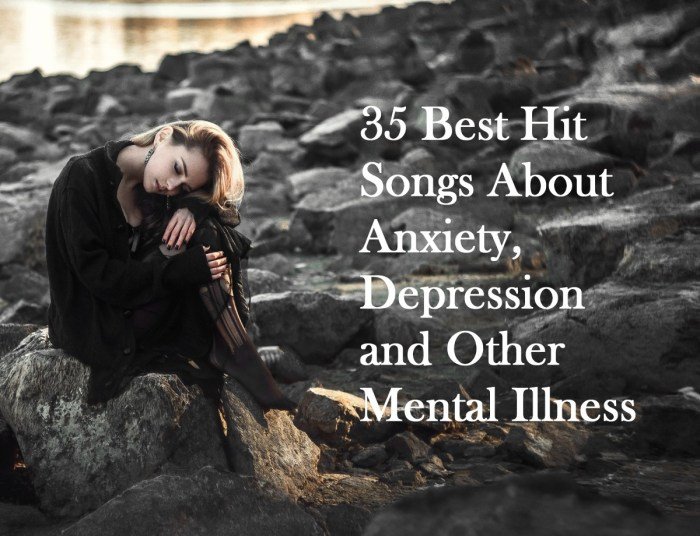
As we delve into the world of mental health songs, we discover a potent force that can inspire healing, empower individuals, and shape a more compassionate society. Through music, we find a language that transcends words, connecting us on a deeply human level and reminding us that we are not alone in our struggles.
These songs offer a testament to the enduring power of music to uplift, inspire, and ultimately, help us navigate the complexities of our mental health journeys.
Common Queries
What are some examples of mental health songs?
There are many, but some well-known examples include “You Oughta Know” by Alanis Morissette, “Hurt” by Nine Inch Nails, and “Someone Like You” by Adele. These songs touch on themes of heartbreak, depression, and anxiety, offering relatable narratives that resonate with listeners.
How can I find mental health songs?
You can search for them online using s like “mental health songs,” “songs about depression,” or “songs about anxiety.” Many music streaming services also have curated playlists focused on mental health themes.
Are mental health songs helpful for everyone?
While many people find solace and connection in mental health songs, it’s important to remember that everyone’s experience is unique. If you’re struggling with mental health, it’s essential to seek professional help and support.